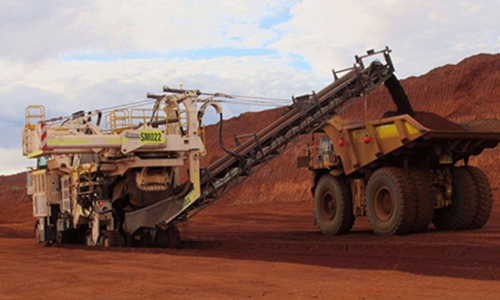Iron ore trade won’t be immune to China-Australia friction
Source: Global Times Published: 2020/6/14 22:16:57

An iron ore mining site in Australia Photo: cnsphotos
A recent CNBC report, citing industry insiders, said that Australian iron ore is "critical" to China, which is the world's biggest iron ore consumer, and Chinese steel producers may suffer and face difficulties in finding alternatives if China puts curbs on imports of Australian iron ore, especially at a time when the central government is implementing stimulus plans by boosting infrastructure.
There is indeed some truth in the argument that curbing Australian iron ore imports would have negative impacts on China's economy, but Australia would suffer much greater economic damage if China were to make such a move. Without Australian iron ore, China may have to pay more and spend time seek alternatives from Brazil or Africa and cultivate domestic iron ore sources. Australia, however, will never find big buyer to replace China, especially considering the coronavirus pandemic has weighed down global demand for commodities.
While there is no denying that China would face economic repercussions if it bans or restricts Australian iron ore imports, the Australian economy would definitely suffer more. It would be a big mistake for anyone to think that despite its dependence on iron ore China wouldn't cut Australian imports. China will not tolerate further behavior that touches its bottom line, even if retaliation comes at the expense of its economic interests.
Of course, given Australian exporters' dependence on the Chinese market, China has wide range of potential targets if bilateral ties continue to deteriorate. And that's why restricting iron ore imports are not likely the first option, especially considering the negative impact such a move would have on the Chinese economy. But this is by no means a reason for the outside world to think that China will continue to tolerate provocations from Australian politicians.
After China warned Chinese tourists and students to avoid Australia, Australian Prime Minister Scott Morrison said last week that he would not be coerced. Australian politicians may think of the country as a victim of a bully, but they must not forget who started the dispute in the first place. It is the responsibility of the government to ease tensions and promote economic and trade exchanges for the well-being of its people, instead of inviting political troubles that inflict pain on its economic development.
So far, China-Australia relations have yet to reach the stage where their iron ore trade needs to be impacted, and we hope the situation doesn't deteriorate further.
Posted in: GT VOICE